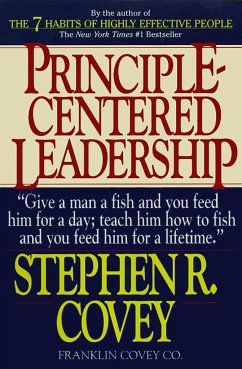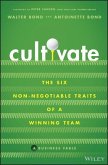Stephen R Covey
Principle-Centered Leadership
17,99 €
inkl. MwSt.
Versandfertig in über 4 Wochen

9 °P sammeln
Stephen R Covey
Principle-Centered Leadership
- Broschiertes Buch
- Merkliste
- Auf die Merkliste
- Bewerten Bewerten
- Teilen
- Produkt teilen
- Produkterinnerung
- Produkterinnerung
Covey, the author of the New York Times #1 bestseller The 7 Habits of Highly Effective People, has struck a chord with millions of readers with his insights into human nature and values. Now he tells them how to apply his theories to everyday life, focusing primarily on the world of business.
Andere Kunden interessierten sich auch für
![S.U.M.O (Shut Up, Move On) S.U.M.O (Shut Up, Move On)]() Paul McGeeS.U.M.O (Shut Up, Move On)13,99 €
Paul McGeeS.U.M.O (Shut Up, Move On)13,99 €![Work on Your Game: Use the Pro Athlete Mindset to Dominate Your Game in Business, Sports, and Life Work on Your Game: Use the Pro Athlete Mindset to Dominate Your Game in Business, Sports, and Life]() Dre BaldwinWork on Your Game: Use the Pro Athlete Mindset to Dominate Your Game in Business, Sports, and Life23,99 €
Dre BaldwinWork on Your Game: Use the Pro Athlete Mindset to Dominate Your Game in Business, Sports, and Life23,99 €![Cultivate Cultivate]() Walter BondCultivate22,99 €
Walter BondCultivate22,99 €![The Hard Hat The Hard Hat]() Jon GordonThe Hard Hat23,99 €
Jon GordonThe Hard Hat23,99 €![Mindfulness Without the Bells and Beads Mindfulness Without the Bells and Beads]() Clif SmithMindfulness Without the Bells and Beads23,99 €
Clif SmithMindfulness Without the Bells and Beads23,99 €![In Search of Leaders In Search of Leaders]() Hilarie OwenIn Search of Leaders94,99 €
Hilarie OwenIn Search of Leaders94,99 €![Leading for Impact Leading for Impact]() Jennifer SchielkeLeading for Impact19,99 €
Jennifer SchielkeLeading for Impact19,99 €-
-
-
Covey, the author of the New York Times #1 bestseller The 7 Habits of Highly Effective People, has struck a chord with millions of readers with his insights into human nature and values. Now he tells them how to apply his theories to everyday life, focusing primarily on the world of business.
Hinweis: Dieser Artikel kann nur an eine deutsche Lieferadresse ausgeliefert werden.
Hinweis: Dieser Artikel kann nur an eine deutsche Lieferadresse ausgeliefert werden.
Produktdetails
- Produktdetails
- Verlag: Free Press
- Seitenzahl: 336
- Erscheinungstermin: 1. Oktober 1992
- Englisch
- Abmessung: 215mm x 140mm x 20mm
- Gewicht: 313g
- ISBN-13: 9780671792800
- ISBN-10: 0671792806
- Artikelnr.: 22041027
- Herstellerkennzeichnung
- Libri GmbH
- Europaallee 1
- 36244 Bad Hersfeld
- 06621 890
- Verlag: Free Press
- Seitenzahl: 336
- Erscheinungstermin: 1. Oktober 1992
- Englisch
- Abmessung: 215mm x 140mm x 20mm
- Gewicht: 313g
- ISBN-13: 9780671792800
- ISBN-10: 0671792806
- Artikelnr.: 22041027
- Herstellerkennzeichnung
- Libri GmbH
- Europaallee 1
- 36244 Bad Hersfeld
- 06621 890
Recognized as one of Time magazine’s twenty-five most influential Americans, Stephen R. Covey (1932–2012) was an internationally respected leadership authority, family expert, teacher, organizational consultant, and author. His books have sold more than twenty-five million copies in thirty-eight languages, and The 7 Habits of Highly Effective People was named the #1 Most Influential Business Book of the Twentieth Century. After receiving an MBA from Harvard and a doctorate degree from Brigham Young University, he became the cofounder and vice chairman of FranklinCovey, a leading global training firm.
Contents
Preface: A Principle-Centered Approach
Section 1: PERSONAL AND INTERPERSONAL EFFECTIVENESS
Introduction to Section 1
Chapter 1 Characteristics of Principle-Centered Leaders
Chapter 2 Seven Habits Revisited
Chapter 3 Three Resolutions
Chapter 4 Primary Greatness
Chapter 5 A Break with the Past
Chapter 6 Six Days of Creation
Chapter 7 Seven Deadly Sins
Chapter 8 Moral Compassing
Chapter 9 Principle-Centered Power
Chapter 10 Clearing Communication Lines
Chapter 11 Thirty Methods of Influence
Chapter 12 Eight Ways to Enrich Marriage and Family Relationships
Chapter 13 Making Champions of Your Children
Section 2: MANAGERIAL AND ORGANIZATIONAL DEVELOPMENT
Introduction to Section 2
Chapter 14 Abundance Managers
Chapter 15 Seven Chronic Problems
Chapter 16 Shifting Your Management Paradigm
Chapter 17 Advantages of the PCL Paradigm
Chapter 18 Six Conditions of Empowerment
Chapter 19 Managing Expectations
Chapter 20 Organizational Control Versus Self-Supervision
Chapter 21 Involving People in the Problem
Chapter 22 Using Stakeholder Information Systems
Chapter 23 Completed Staff Work
Chapter 24 Manage from the Left, Lead from the Right
Chapter 25 Principles of Total Quality
Chapter 26 Total Quality Leadership
Chapter 27 Seven Habits and Deming's 14 Points
Chapter 28 Transforming a Swamp into an Oasis
Chapter 29 Corporate Constitutions
Chapter 30 Universal Mission Statement
Chapter 31 Principle-Centered Learning Environments
Epilogue: Fishing the Stream
A Personal Note
Acknowledgments
Index
Preface: A Principle-Centered Approach
Section 1: PERSONAL AND INTERPERSONAL EFFECTIVENESS
Introduction to Section 1
Chapter 1 Characteristics of Principle-Centered Leaders
Chapter 2 Seven Habits Revisited
Chapter 3 Three Resolutions
Chapter 4 Primary Greatness
Chapter 5 A Break with the Past
Chapter 6 Six Days of Creation
Chapter 7 Seven Deadly Sins
Chapter 8 Moral Compassing
Chapter 9 Principle-Centered Power
Chapter 10 Clearing Communication Lines
Chapter 11 Thirty Methods of Influence
Chapter 12 Eight Ways to Enrich Marriage and Family Relationships
Chapter 13 Making Champions of Your Children
Section 2: MANAGERIAL AND ORGANIZATIONAL DEVELOPMENT
Introduction to Section 2
Chapter 14 Abundance Managers
Chapter 15 Seven Chronic Problems
Chapter 16 Shifting Your Management Paradigm
Chapter 17 Advantages of the PCL Paradigm
Chapter 18 Six Conditions of Empowerment
Chapter 19 Managing Expectations
Chapter 20 Organizational Control Versus Self-Supervision
Chapter 21 Involving People in the Problem
Chapter 22 Using Stakeholder Information Systems
Chapter 23 Completed Staff Work
Chapter 24 Manage from the Left, Lead from the Right
Chapter 25 Principles of Total Quality
Chapter 26 Total Quality Leadership
Chapter 27 Seven Habits and Deming's 14 Points
Chapter 28 Transforming a Swamp into an Oasis
Chapter 29 Corporate Constitutions
Chapter 30 Universal Mission Statement
Chapter 31 Principle-Centered Learning Environments
Epilogue: Fishing the Stream
A Personal Note
Acknowledgments
Index
Contents
Preface: A Principle-Centered Approach
Section 1: PERSONAL AND INTERPERSONAL EFFECTIVENESS
Introduction to Section 1
Chapter 1 Characteristics of Principle-Centered Leaders
Chapter 2 Seven Habits Revisited
Chapter 3 Three Resolutions
Chapter 4 Primary Greatness
Chapter 5 A Break with the Past
Chapter 6 Six Days of Creation
Chapter 7 Seven Deadly Sins
Chapter 8 Moral Compassing
Chapter 9 Principle-Centered Power
Chapter 10 Clearing Communication Lines
Chapter 11 Thirty Methods of Influence
Chapter 12 Eight Ways to Enrich Marriage and Family Relationships
Chapter 13 Making Champions of Your Children
Section 2: MANAGERIAL AND ORGANIZATIONAL DEVELOPMENT
Introduction to Section 2
Chapter 14 Abundance Managers
Chapter 15 Seven Chronic Problems
Chapter 16 Shifting Your Management Paradigm
Chapter 17 Advantages of the PCL Paradigm
Chapter 18 Six Conditions of Empowerment
Chapter 19 Managing Expectations
Chapter 20 Organizational Control Versus Self-Supervision
Chapter 21 Involving People in the Problem
Chapter 22 Using Stakeholder Information Systems
Chapter 23 Completed Staff Work
Chapter 24 Manage from the Left, Lead from the Right
Chapter 25 Principles of Total Quality
Chapter 26 Total Quality Leadership
Chapter 27 Seven Habits and Deming's 14 Points
Chapter 28 Transforming a Swamp into an Oasis
Chapter 29 Corporate Constitutions
Chapter 30 Universal Mission Statement
Chapter 31 Principle-Centered Learning Environments
Epilogue: Fishing the Stream
A Personal Note
Acknowledgments
Index
Preface: A Principle-Centered Approach
Section 1: PERSONAL AND INTERPERSONAL EFFECTIVENESS
Introduction to Section 1
Chapter 1 Characteristics of Principle-Centered Leaders
Chapter 2 Seven Habits Revisited
Chapter 3 Three Resolutions
Chapter 4 Primary Greatness
Chapter 5 A Break with the Past
Chapter 6 Six Days of Creation
Chapter 7 Seven Deadly Sins
Chapter 8 Moral Compassing
Chapter 9 Principle-Centered Power
Chapter 10 Clearing Communication Lines
Chapter 11 Thirty Methods of Influence
Chapter 12 Eight Ways to Enrich Marriage and Family Relationships
Chapter 13 Making Champions of Your Children
Section 2: MANAGERIAL AND ORGANIZATIONAL DEVELOPMENT
Introduction to Section 2
Chapter 14 Abundance Managers
Chapter 15 Seven Chronic Problems
Chapter 16 Shifting Your Management Paradigm
Chapter 17 Advantages of the PCL Paradigm
Chapter 18 Six Conditions of Empowerment
Chapter 19 Managing Expectations
Chapter 20 Organizational Control Versus Self-Supervision
Chapter 21 Involving People in the Problem
Chapter 22 Using Stakeholder Information Systems
Chapter 23 Completed Staff Work
Chapter 24 Manage from the Left, Lead from the Right
Chapter 25 Principles of Total Quality
Chapter 26 Total Quality Leadership
Chapter 27 Seven Habits and Deming's 14 Points
Chapter 28 Transforming a Swamp into an Oasis
Chapter 29 Corporate Constitutions
Chapter 30 Universal Mission Statement
Chapter 31 Principle-Centered Learning Environments
Epilogue: Fishing the Stream
A Personal Note
Acknowledgments
Index







